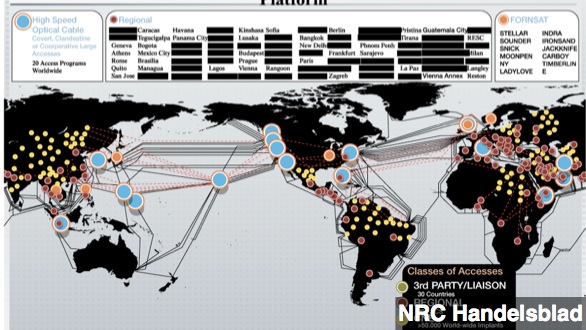The latest leak from Edward Snowden's NSA files details a network of taps that collected data from all over the world.
A presentation slide published in Dutch newspaper NRC Handelsblad shows as of mid-2012, the NSA had infected more than 50,000 computer networks around the world with malware designed to steal information.
The infiltrations, known as "implants," are reportedly remote-controllable and can be activated and deactivated at will when they're needed.
If that sounds familiar, it's because The Washington Post reported on the same program in August. The NSA reportedly plans to have 85,000 implants in place by the end of 2013.
This worldwide network is said to be handled by the NSA's Tailored Access Operations division, or TAO. This group of 1,000-plus hackers breaks into vulnerable networks to create implants and siphon off data. (Via PC Magazine)
And given the NSA's slide laid out 50,000 implants as of last year, TechCrunch says TAO looks to be right on track.
It's "basically what you'd call textbook spy work in the digital age, from an agency tasked with spying. To hear from Snowden documents via the NRC that it's now climbed to 50,000 is hardly surprising."
And it appears the NSA expected the expansion of its data-mining efforts would continue unimpeded.
An article published last week in The New York Times details a leaked 2012 paper that laid out the NSA's broad plans for its next four years of intelligence collection.
And the NSA had its eyes on the lofty prize of ... everything. That strategy document said it wanted to be able to grab any data it needed from "anyone, anytime, anywhere."
Whether that stratospheric goal — or the proliferation of implants — has changed since Edward Snowden made off with his trove of data isn't clear. The NSA declined to comment on this latest development.


